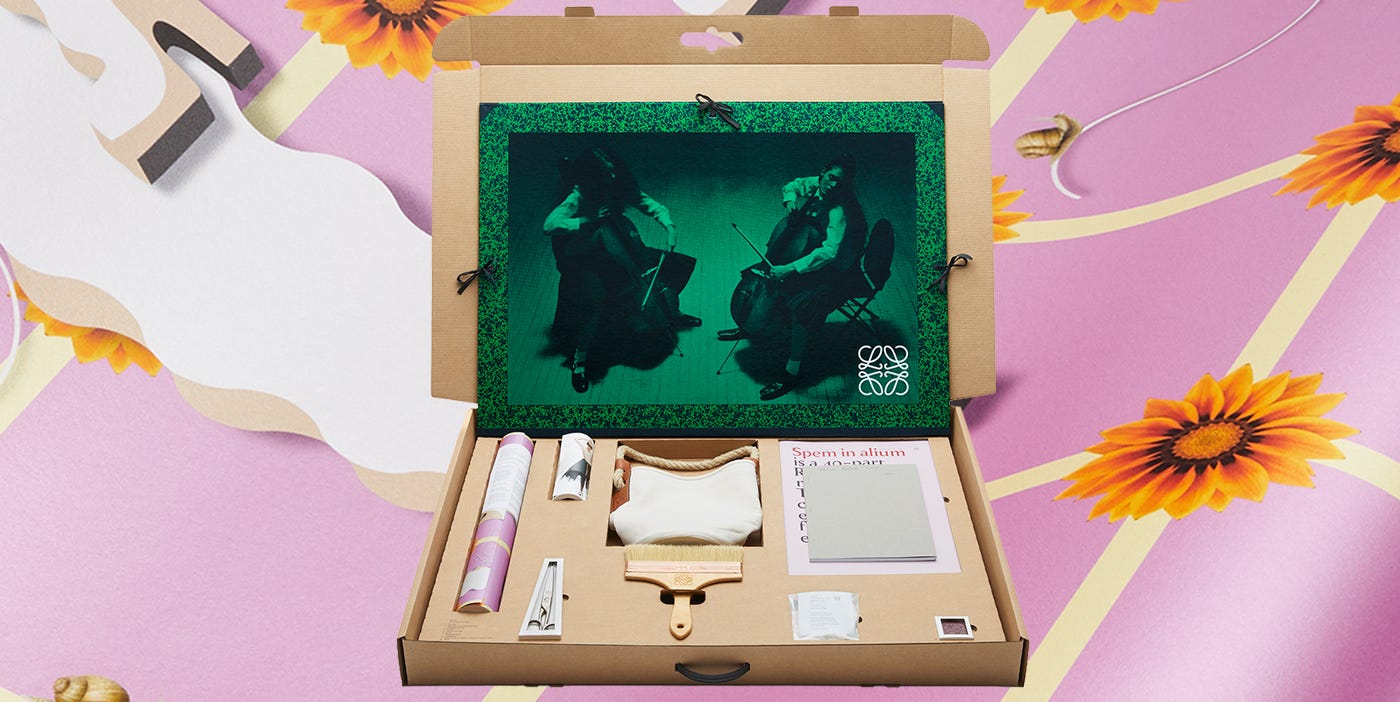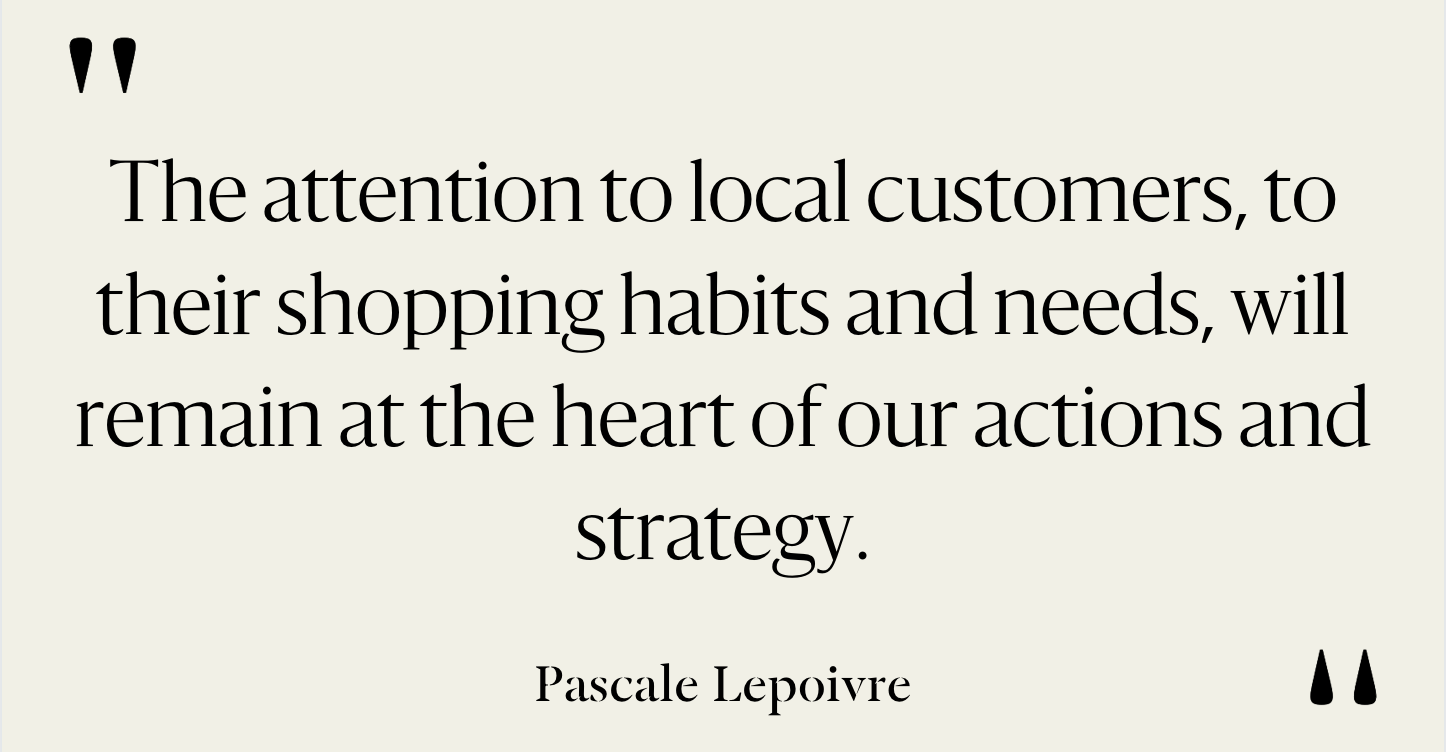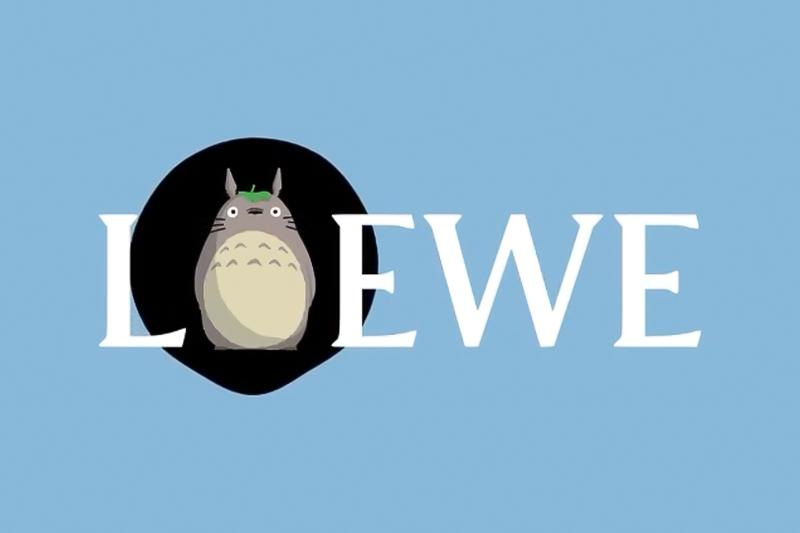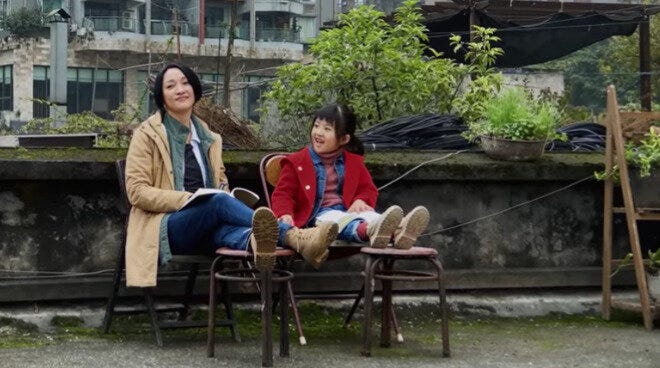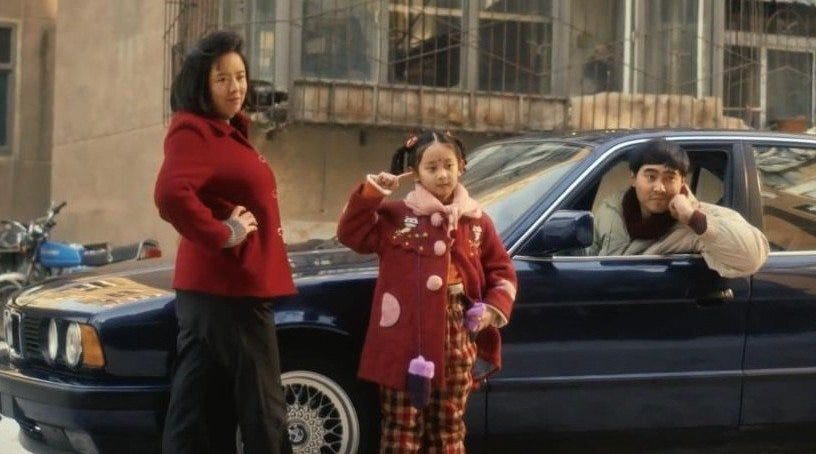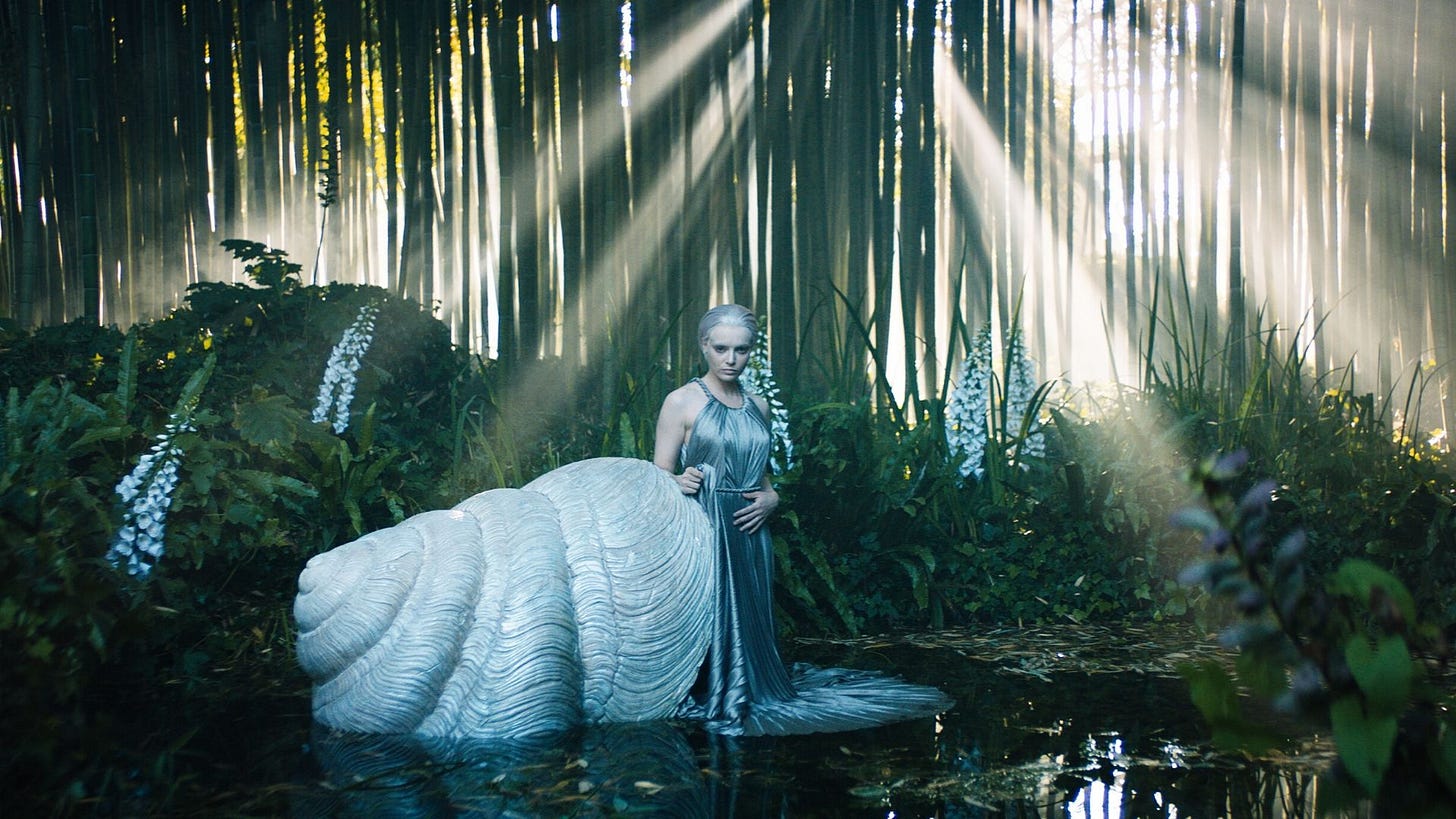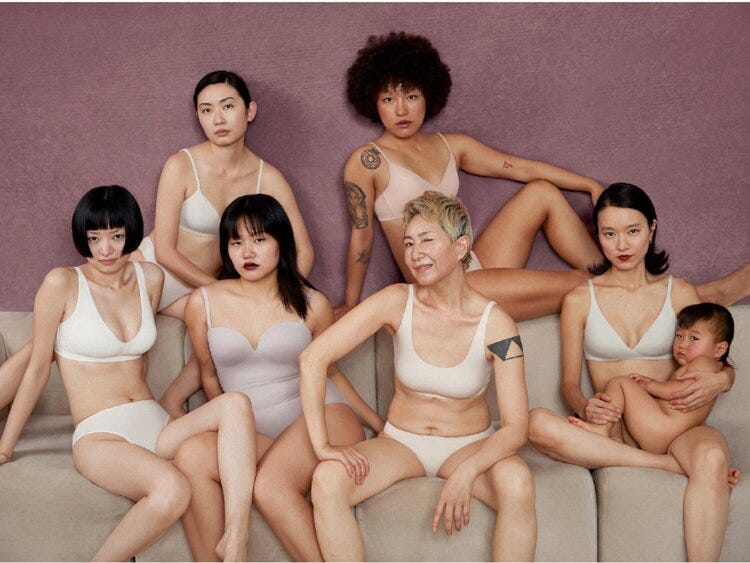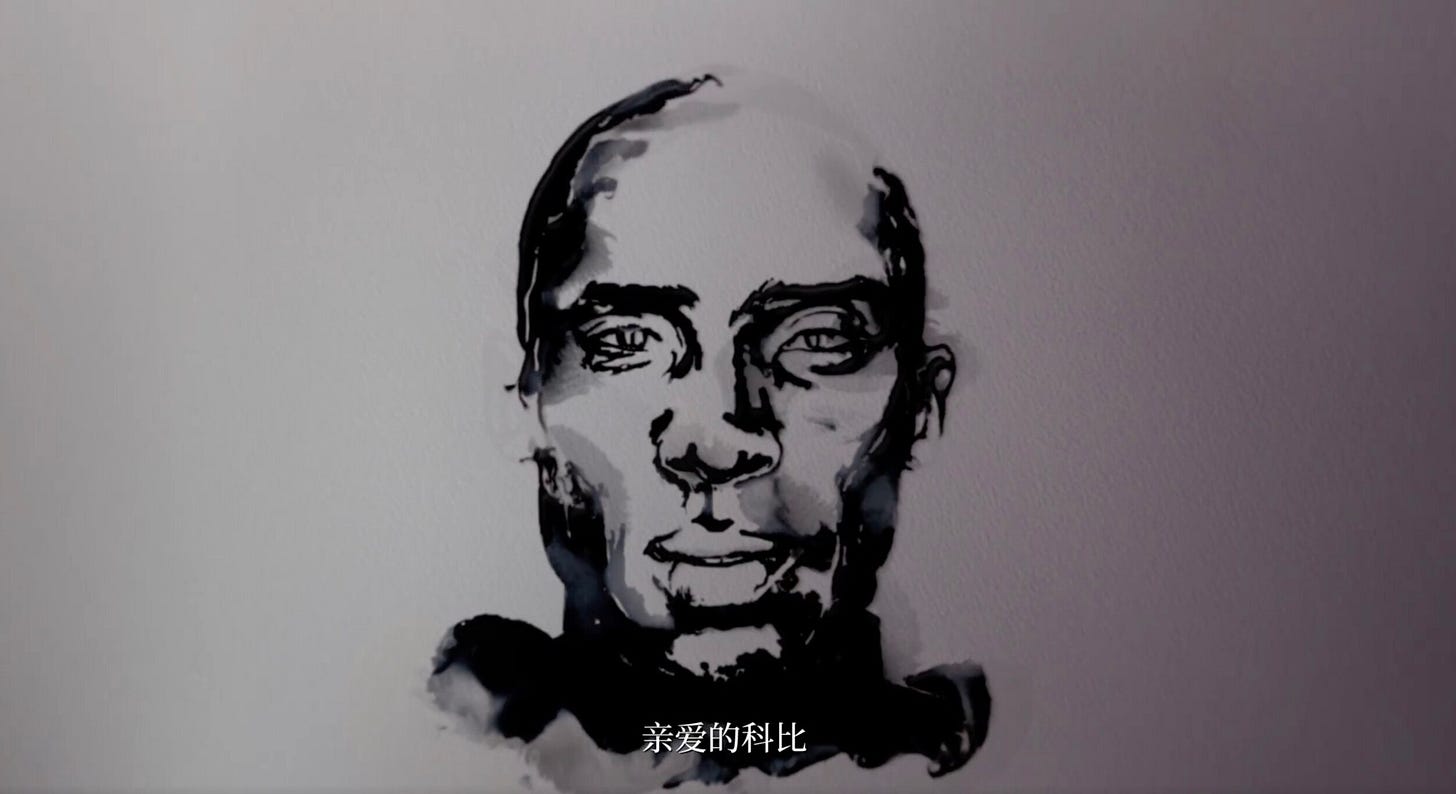CCI Q&A: Loewe CEO Pascale Lepoivre on Creative Content for Luxury
Plus: Our 2020 Best of Brand Film Picks, from Apple and Nike to Dior and Oppo.
The Content Commerce Insider newsletter highlights how brands create content to drive revenue. If you have received our newsletter from a friend or colleague, we hope you will subscribe as well and follow us on LinkedIn and Instagram.
As 2020 draws to a close, Content Commerce Insider has been catching up with leaders in their fields to share reflections on this transformative period as well as predictions for what comes next. In the fourth and final installment of our year-end Q&A series, we connected with Pascale Lepoivre, CEO of the Spanish luxury fashion house Loewe.
Taking the reins at the 174-year-old, LVMH-owned luxury brand in 2016 after a storied career that included nearly a decade at Celine and more than 10 years at Louis Vuitton, Pascale Lepoivre has presided over an exceptionally creative period at Madrid-based Loewe. Working closely with creative director Jonathan Anderson, one of the most influential forces in luxury fashion today, Lepoivre has been instrumental in expanding Loewe’s global footprint while strengthening its artistic roots and maintaining top-tier craftsmanship.
CCI: In 2020, due to the pandemic Loewe took a more intimate and engaging approach to new collection debuts via the Show in a Box and Show on the Wall, both of which attracted a huge amount of media attention. Is this personal and creative approach here to stay or do you expect it to be a time capsule of this year?
Pascale Lepoivre: Putting together both our Show in a Box and Show on the Wall have been very enriching, and a great, stimulating way to engage all teams creatively at a particularly complex moment. It really allowed us to connect with the audience and clients in a different, more intimate way than by just sending out perfect video images. Having said that, we miss the experience and the “moment” of the runway as well as the physical interaction with the clothes. So, we absolutely look forward to going back to live shows as soon as possible, while maintaining a more engaging and creative approach to content creation — keeping, for instance, our Loewe en Casa program with regular talks from artists and artisans throughout the world.
CCI: Considering your deep experience in the luxury industry, how do you see the impact of Covid in 2020 compared to past global events like the economic crisis of 2008-2009, in terms of how it could change consumer habits in the long term?
Lepoivre: We need to be very much humble when trying to assess the future. A lot of the predictions made since the beginning of this crisis have been proven wrong. The major impact, compared to previous crises, is on international travel, which plays a major role in the worldwide luxury economy. Will it resume as before at some stage and if so, when? We guess it will take some time, and that shopping locally and online will remain strong as these trends were already there. We do miss our international clients, but we have put unprecedented focus on connecting to local clienteles in our stores and online in a more personal way, and this has been key to getting through 2020 and now obviously 2021. The attention to local customers, to their shopping habits and needs, will remain at the heart of our actions and strategy.
CCI: Loewe is very well established in Europe and Japan, but is newer to the U.S. and China markets. How does Loewe plan to approach brand-building in newer markets in 2021 and onwards?
Lepoivre: In the United States we are indeed at the beginning of a new roadmap, it is less the case in China and the rest of Asia, where we have been growing at a steady pace for a number of years now. We have refitted our entire network with our new store concept, pushing the walls to feature more categories, and we have opened a significant number of new cities and a Casa Loewe store in Beijing. Online and omnichannel have been accelerating since last summer, and we have successfully localized a large part of our marketing and communication initiatives. This has been the key recipe for success in China and it is central to the way of approaching new countries or regions.
CCI: In the year ahead, do you plan to continue opening new stores or focus more on upgrading existing stores and building on your digital efforts?
Lepoivre: Of course opening new stores must be done in a more cautious way but it is part of our plans for the coming years. Loewe’s footprint is not yet at the level of the brand’s growing influence, so increasing our visibility is still a priority. We are planning to enter new cities in China such as Wuhan, Xiamen, or Ningbo in 2021. Opening a Casa Loewe in Shanghai is planned for 2022 along with some other adjustments to our current network. But for sure digital marketing and digital services will be crucial in addition to the development of our online distribution.
CCI: Many luxury brands are turning to content-commerce strategies like e-commerce livestreaming, brand collaborations, product placement, branded video games, and brand films to reach new audiences. How much does the content-commerce trend fit into Loewe’s current and long-term plans, if at all?
Lepoivre: Since before the crisis, at Loewe we have had a particularly strong focus on content and storytelling, whether working with athletes such as Ning Zetao for our Eye/Loewe/Nature collection, or launching our Casa Loewe Beijing with a William de Morgan themed event. Particularly now that we launched e-commerce in China this September, the content-commerce trend fits very well into our plans, and we are looking at new ways to connect commerce and culture, including new local partnerships, collaborations, and brand friends of house, as well as more video content to better tell those stories.
CCI: Loewe is on the forefront of more eco-friendly luxury fashion by using upcycling as a key part of its Eye/Loewe/Nature collection. Was this a conscious business decision that you expect the industry to follow, or was it driven primarily by consumer demand?
Lepoivre: We believe that the future of the fashion industry must be a more sustainable one, and we are more committed than ever to being a part of that change. We use Eye/Loewe/Nature as the testing ground for more sustainable practices that we can then roll out across the rest of the business. We also see that not only consumers but also our employees, wherever they are based, are becoming increasingly vigilant so we see this topic as a very key one in the coming years.
CCI: Turning back to China, in addition to holding a livestreamed concert this summer to promote the Paula’s Ibiza collection, Loewe has collaborated with The Beast on a flower arrangement gift box and actor Huang Zitao on a version of the Goya backpack. Does the brand plan to do more of these collaborations in 2021, and if so, can you tell us a little about how Loewe decides that a collaboration is the right fit for the brand?
Lepoivre: Collaborations are an important part of our brand, and we definitely have some more lined up for 2021. We have just announced our next collaboration which is a capsule collection with Studio Ghibli and their classic movie “My Neighbor Totoro,” launching in early January. We typically choose who we work with based on shared values, and a partner who we feel will add something exciting to a particular project.
Often these shared values are related to craft and artisanship, as they were with The Beast, or, for example, the ongoing partnership we have with Wallpaper where we work together to tell stories of Chinese craft traditions for Chinese New Year, but the shared values can also be cultural or reflective of a similar energy and spirit such as when we partnered with Modern Sky to create the “Club Paula’s” livestreamed concert which was watched by millions of people on QQ Music.
Special thanks to Pascale Lepoivre and Linda Ting for facilitating this Q&A.
- by Avery Booker
Mentioned in today’s newsletter: Apple, Bilibili, BMW, Celine, DingTalk, Dior, Loewe, Louis Vuitton, Neiwai, Nike, Oppo.
2020 Best of Brand Film Picks
Short films are a key medium used by brands to engage in storytelling that can resonate with Chinese consumers, often incorporating top-notch directors, celebrities, music, and professional effects to create compelling narratives. As the impact of the coronavirus accelerated digital marketing efforts, short films took on an important role in helping brands to stand out through content that could leave a long-lasting, positive impression. As the year draws to a close, CCI shares its selection of brands that stood out in their use of film for Chinese audiences.
Apple
Apple once again marked China’s biggest holiday with a touching film shot through the lens of its latest generation iPhone. As with many of the most impactful brand films seen in China, Apple’s “Daughter” (女儿) didn’t shy away from tackling complex social issues head-on. Intergenerational love and conflict, changing social norms, and working-class struggles are all shot with professional technique to tear-jerking effect.
This year’s film departed from the tradition of hiring Chinese directors to tell stories that are deeply tied to the Spring Festival by tapping Academy Award nominee Theodore Melfi, along with “Joker” cinematographer Laurence Sher, who worked exclusively with iPhone 11 Pros.
More from Apple:
Love Is in The Air(Pod): Apple Shows Its Romantic Side for Qixi
Bilibili
The first part of a trilogy, Bilibili’s “Rear Wave” (后浪) was arguably the most-talked about brand film of the year. While some 80% of the video platform’s 200 million users are 25 and under, its appeal to middle-aged audiences is growing as well, as evidenced by the buzz surrounding this short video.
In the four-minute clip, which was aired before state broadcaster CCTV’s nightly news program and promoted by other official media outlets, actor He Bing, 52, gives a motivational speech praising the younger generation, with clips paying homage to the creative spirit embodied by Bilibili’s core demographic. But while his words were criticized by some of the intended audience, they resonated more strongly with older viewers, who could become the next wave of Bilibili’s community as it seeks to diversify.
More from Bilibili:
Bilibili’s “Next Wave” Speaks to Class of 2020
Bilibili Celebrates Creators for Its Birthday
Bilibili Makes Peace With 2020
BMW
Director Ning Hao’s “Bayier’s Spring Festival” (巴依尔的春节) imagined the brand’s Chinese name change to Baoma (宝马, “precious horse”) in the early 1990s from a young boy’s perspective, bringing his broken family back together again in the process. The 22-minute-long film has been among the most-watched of the season on Weibo, with nearly 67 million views to date, underscoring the appeal of an engaging and well-executed story.
More from BMW:
BMW Marks China’s Recovery With Idol Jackson Yee
BMW Retells a Contemporary Chinese Journey to the West
DingTalk
Alibaba’s productivity platform DingTalk saw a huge surge in usage during the coronavirus outbreak to meet the demand for remote work and education. However, some Chinese students were extremely dismayed over having their “official lazy time” cut short by instructions from teachers to start using DingTalk for online classes and coursework, and they began flooding the app store with one-star reviews of the product based solely on those circumstances.
Alibaba responded swiftly and creatively with a meme-filled music video on Bilibili to “apologize and beg for mercy and five-star reviews” which quickly went viral. The video turns the DingTalk bird icon into an animated character, a hardworking little swallow, and uses amateurish production values and childish singing to endear viewers. Its success led to a slew of videos in a similar fashion from other tech platforms and brands clamoring to make an impact on the Gen Z video platform.
Dior
The French luxury house produced a 14-minute-long film, “Le Mythe Dior,” by award-winning Italian director Matteo Garrone, to present the 37 designs of its 2020 Autumn/Winter haute couture line. Within the ethereal film, characters from fairytales and ancient Greek mythology reveal the new creations from Dior’s Maria Grazia Chiuri.
While the film was produced for a global audience, Dior tailored its presentation to Chinese viewers by featuring it as the opener for a celebrity-filled livestream on Weibo to launch the collection. The livestreamed event hit all the right notes: it was cultured, tasteful and aesthetically pleasing, as well as interactive, and brought a much larger audience than the film would have seen on its own had it been simply posted to Weibo. More than 11.3 million viewers tuned in, generating more than 34,000 comments and 4,000 shares.
More from Dior:
Dior’s Futuristic Moves in China
Dior Brings Its Blockbuster Exhibition Into Virtual Reality
Neiwai
For this year’s Women’s Day campaign in March, the domestic lingerie brand challenged China’s rather rigid standards of female beauty with a message inspired by body positivity, a movement that has gained momentum in the West but has yet to make significant inroads in China. Neiwai invited photographer Luo Yang, whose own work has long focused on women’s bodies, to lead a project featuring six women of varying ages, body types and skin tones.
The fourteen-minute “No Body is Nobody” is a behind-the-scenes documentary of the process, with Luo and her subjects speaking candidly about their relationships with their bodies, their impressions of the others and how they have been perceived, a fitting theme given the brand’s name, which means “inside-outside” in Chinese.
More from Neiwai:
Neiwai Looks at Intimacy From the Inside Out
Nike
Basketball fans around the world mourned the sudden death of NBA legend Kobe Bryant in a helicopter crash in January, and especially in China, where he had been hugely popular for many years.
Since then, Nike, which signed Bryant back in 2003, has released a series of films honoring the late athlete, including “Dear Kobe,” (亲爱的科比), produced especially for Chinese fans.
The visual imagery is effective and moving, combining references to Chinese traditions of ink painting with the more contemporary style of comics and graphic novels, and its narrative speaks directly to Chinese experiences, in this case, the national passion for basketball and ongoing efforts to develop domestic talent.
More from Nike:
Nike Puts the Sports in Esports
Oppo
Tapping into the trend for professional-quality branded songs, League of Legends 2020 World Championships sponsor Oppo produced its own music video to promote a limited-edition Find X2 handset collaboration created for the event. “Be the Legend” (英雄登场), sung in English by Tia Ray, drew rave reviews from fans inside and outside China who prefer the branded song and video to “Take Over,” LoL’s official theme song for the championship.
Oppo’s video subtly incorporates the brand through both lyrics (“Find X/ Find more”) and visual elements such as the large X that appears in the sky at the end, and the commercial aspect hasn’t deterred viewers. After its release on October 12 (exactly one week before the launch of the limited-edition phone), the video was viewed more than 3.2 million times on Bilibili and its hashtag has made 230 million impressions on Weibo.
More from Oppo:
Oppo Finds International Stars for Global Push
Oppo’s Cinematic Gaming Adventure
Oppo’s National Geographic Adventure
News in English
The coronavirus has shifted the cultural focus of luxury brands to China, from digital marketing efforts to fashion shows and other areas. Glossy
As marriages in China fell to a 13-year low in 2019, single people are becoming a major driver of consumption with increasing discretionary spending power. SCMP
The fight to win rural consumers is a major reason why community group buying is the hottest trend in Chinese e-commerce right now, with all the major tech platforms vying for supremacy. Tech Buzz China
Lin Qi, CEO of gaming firm Yoozoo and an executive producer of Netflix’s upcoming adaptation of “The Three-Body Problem,” died at 39 after being hospitalized amid suspicions that he was poisoned. Variety
Hanfu for the holidays: Young aficionados of traditional Chinese clothing have incorporated Christmas themes into the historical styles. Sixth Tone
We’ve Got China Covered
China Film Insider: TV Host Sorry for Accepting Gifts From Celebrity Guests’ Fans
Jing Daily: The Top Five Gen-Z Trends of 2020
Jing Culture & Commerce: Behind Perfect Diary’s Winning Cultural Collaboration Strategy




